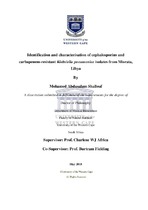Identification and characterisation of cephalosporins and carbapenem-resistant Klebsiella pneumoniae isolates from Misrata, Libya
Abstract
Background: Extended-spectrum beta-lactamase-producing (ESBL) and carbapenemaseproducing
Gram-negative bacilli showing resistance to cephalosporins and carbapenems
respectively, have been reported from several countries globally and recently among Libyan
combatants who have been transferred to European countries for advanced medical care.
However, there is a lack of data about their presence in Misrata and in Libya in general. This is
the first documented study aimed at investigating the prevalence and resistance mechanisms of
ESBL and carbapenemase-producing K. pneumoniae isolates from Misrata.
Materials and Methods: Two hundred Gram-negative bacillus isolates were collected and
identified from hospitals and pathology laboratories in Misrata. Following antimicrobial
susceptibility screening, those showing resistance to cephalosporin and carbapenem were tested
for ESBL activity using the Modified double disc synergy test, Sensititer ESBL confirmatory MIC
plates and MAST AmpC detection sets D52C and D68C. Carbapenemase activity was detected
using RAPIDEC CARBA NP test, Modified Hodge test (MHT), carbapenem inactivation methods
(CIM), carbapenem combined test (CCT), and by MAST carba puls set. ESBL and
carbapenemases genes were detected using multiplex PCR.
Results: K. pneumoniae was the predominant species (85/200) of the 14 species identified, with
56 (65.8%) showing carbapenem resistance, 16 (18.8%) were cephalosporin-resistant
carbapenem-susceptible and 13 (15.2%) were susceptible to all antibiotics except ampicillin.
OXA-48 was the only carbapenemase detected, with SHV, TEM and CTX-M group 1 found in
almost all carbapenem and cephalosporin resistant K. pneumoniae. Rep-PCR analysis revealed
multiple clones and some K. pneumoniae strains were genetically related or indistinguishable
despite differences in ESBL genes or carbapenemase activity.
Conclusion: The findings of this study show that carbapenemase- and ESBL-producing K.
pneumoniae are prevalent in Misrata and emphasize the urgent need for optimized infection
control and antibiotic stewardship programmes in the Libyan hospitals to prevent further spread
of these organisms.

